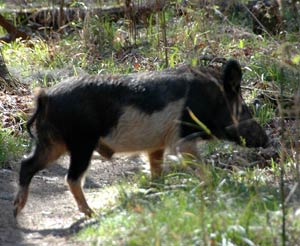The bacteria that causes brucellosis has been detected for the first time in feral pigs in North Carolina, according to a study by North Carolina State University.
 The bacteria, Brucella suis, can be transmitted to people through improper butchering or handling of infected swine or by consuming undercooked meat. Symptoms often resemble the flu in humans, making detection and swift diagnosis problematic. The bacteria also can spread through pig populations and threaten farm livestock as well as feral populations.
The bacteria, Brucella suis, can be transmitted to people through improper butchering or handling of infected swine or by consuming undercooked meat. Symptoms often resemble the flu in humans, making detection and swift diagnosis problematic. The bacteria also can spread through pig populations and threaten farm livestock as well as feral populations.
The university study was performed on feral pigs in Johnston County, where about 9 percent of pigs showed the bacteria or antibodies that meant the animals had been exposed to it. Less than 1 percent were shown to have contact with the disease through random testing of 13 other sites.
“It’s an old disease but we don’t see it often in this country, so its easy to overlook,” said Suzanne Kennedy-Stoskopf, professor of wildlife infectious disease at N.C. State and one of the authors of the paper, published in the Journal of Wildlife Diseases. “Some physicians would see it and not recognize it.”
In this report, Dr. Chris DePerno, associate professor of forestry and environmental resources at N.C. State and the corresponding author of a paper describing the research, says the results are troubling for people who hunt feral pigs for sport or food.
“Now that exposure to Brucella suis has been found in North Carolina’s feral pig populations, people need to take care when hunting, butchering and cooking feral pigs,” DePerno told ScienceDaily.com. “That means wearing gloves when field dressing feral pigs and cooking the meat to the proper temperature.”
For hunters pursuing hogs or landowners managing the feral critters, extra care should be taken when butchering, preparing or cooking the meat.
Check out this National Feral Swine Mapping System from state wildlife agencies and USDA-APHIS-Wildlife Services: Click here
